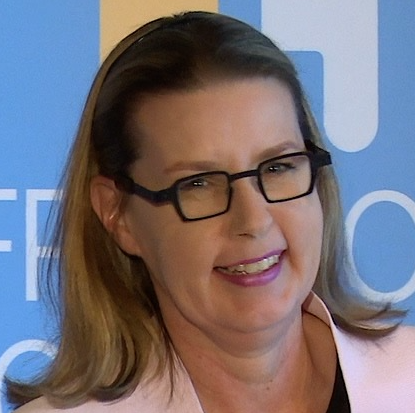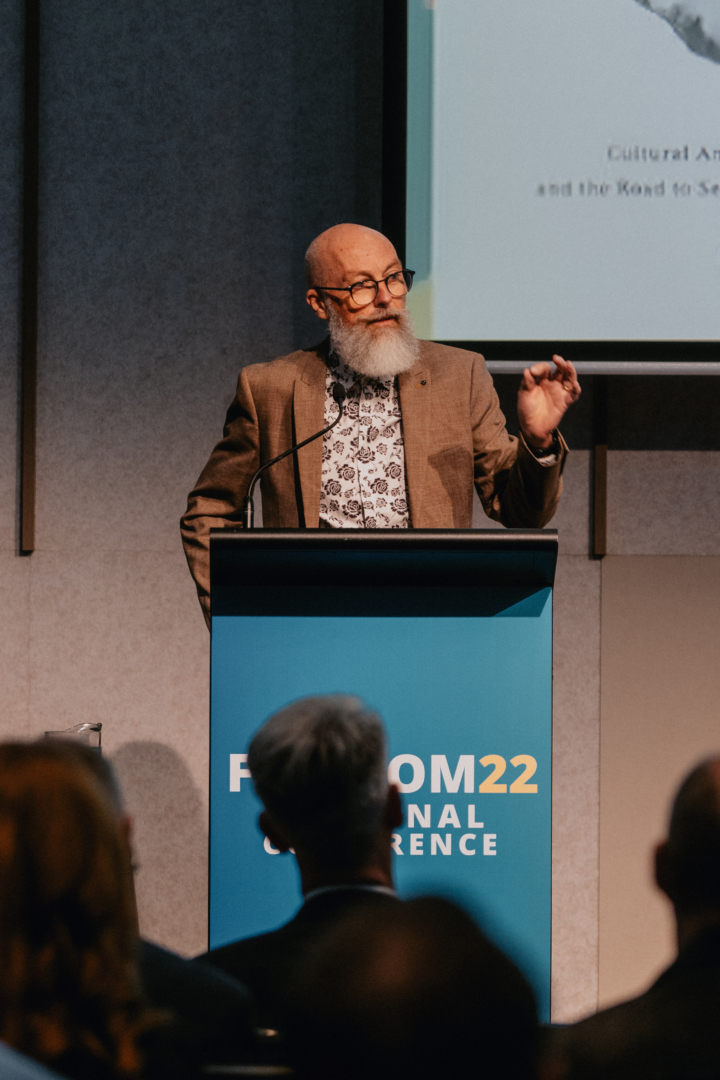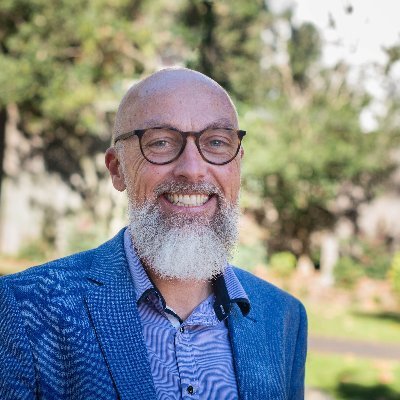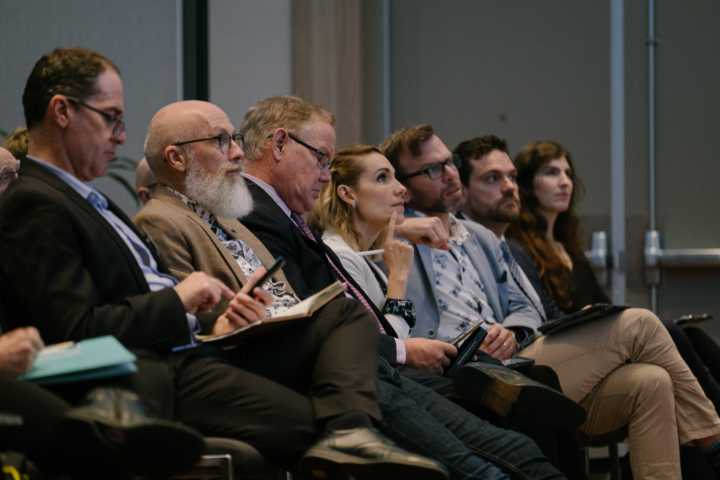A Christian Framework for Religious Diversity in Political Discourse
Transcript of Dr. Alex Deagon’s talk at Freedom18 on 23 May 2018 ‘A Christian Framework for Religious Diversity in Political Discourse’
My talk today is going to be on the issue of religious diversity in political discourse. In particular, what I want to try to do is create a Christian framework for facilitating religious diversity in political discourse. And the catalyst for this consideration is really what’s starting to be, or has been a prevailing view, which John Anderson has alluded to already, which is that religious views, and I think particularly, Christian views, have no place in politics. They have no place in debates on public policy. And this view is characteristic of many politicians, as well as many scholars of political theory.
Just to share a few examples with you and by the way, there were to be slides for this, which would’ve, I’m sure, assisted you in following, but those have now been printed out and are in your bags as well, if you want to pull those out and follow along.
But just to point out a few examples. Last year, at the Frank Walker Memorial Lecture, Senator Penny Wong argued that the application of religious belief to the framing of law in a secular society leads, not only to confusion, but also to inequity. So it’s a problem not only conceptually, she said, but it also leads to inequity, which is code for discrimination, ultimately, in laws. I have also given a couple of examples of views from prominent political theorists, John Rawls and Robert Audi, only public reason or secular reason should form the basis for political decisions resulting in coercive laws. Secular reason is more overt, the idea that people generally give justification for policy positions based in secular arguments and secular points of view. Public reason, John Rawls … the kind of philosophy John Rawls has articulated … I think, ultimately, it’s more neutral in its term, but ultimately I think it boils down to a kind of secular reason as well.
And this approach has been a traditionally accepted approach in liberal politics because it sets and promotes neutrality and equality and fairness because religious views are partisan, there’s conflict between them, and allowing religious views into politics will lead to violence and strife and conflict. And the idea is to avoid that.
So where does Christian theology come into the discussion? I think what my book does is it really lays the conceptual foundation for challenging this prevailing point of view. So what I do in the book is I argue two basic propositions. The first is that liberalism, and particularly secular liberalism, is not a neutral approach between competing perspectives, or indeed, between competing religious perspectives. It is actually itself, no doubt, a kind of metaphysical perspective but I argue a type of religious or theological perspective. And more significantly, it’s the kind of perspective that actually relies on violence. I’ll explain what I mean by that a bit later on, but what I’m talking about here is not so much the kind of violence that you get in secular, authoritarian states where different views are violently
suppressed through police and through government. I’m talking more about at a conceptual level, and as I said, I’ll explain what I mean by that a little later on.
And the second proposition I argue is that Christianity provides an alternative framework for this secular, liberal framework, and that framework is based in peace, rather than violence. And this Christian framework is expressing the idea of the law of love.
In the book, I argue these propositions in the context of a foundation for legal community. And I don’t directly address the idea of religious freedom, so my design in this talk is to apply these propositions from my book to make a case that Christianity is the most desirable framework for promoting religious diversity in political discourse.
So I claim that secular liberalism is a theology, and I develop, as you see in the papers you’ve got, a kind of cumulative argument for that proposition. My first point to that argument is that the notion of the secular originated from within Christianity, and it’s based on theological assumptions about the nature of being and knowledge. As we would be aware, power denominations created within Christianity, people look at scripture and they come up with different interpretations and then they split off and make little groups which adhere to their interpretations of scripture. But we wouldn’t call those different denominations secular, we wouldn’t call them non-religious. We would just call them different denominations of the same religion or different religions, if we’re talking, say, about Jehovah’s Witnesses or Mormons or whatever.
So I think it’s the same idea with the notion of the secular. I can’t get into the details here, but the basic idea is that the traditional scholastic theologians, like Aquinas, argue that one could only know God and true reality through faith and through revelation. But other theologians coming after Aquinas challenged that and said, “Well actually, we can, God has given us reason, and we can actually know true reality and know God purely through reason, without the assistance of faith or revelation.” Hence, created this separate space of knowing about reality and knowing about God, which became the secular space, the non-religious space.
And so the notion of the secular, where there’s no need for faith, no need for divine revelation, this becomes the secular space, and this, I would say, is actually a different kind of religious view. It’s a different kind of theological approach to understanding, being, and knowledge. It’s not a non-religious approach to understanding, being, and knowledge.
Secondly, I argue that secular liberalism actually has a faith object, like religious denominations or religions have a faith object, God or Allah or whatever it may be. Secular liberalism has a faith object, and that faith object is reason. So in religions, it’s faith or a holy text, which is the authoritative criteria for determining between truth and falsehood. And I say for secular liberalism or secularism in general, reason is the criteria that we use to decide between truth and falsehood.
If we think about it, just as you can’t justify faith without referring to faith, without needing faith, in the same way, you can’t actually justify reason without referring to reason. It’s intrinsically circular. You have to stop somewhere. So the only way to try to justify reason is to use reason, which means you can’t justify reason without reason. So we, in other words, trust that reason gives us accurate representations about reality. And so, in that sense, I argue that secular liberalism has a faith in reason. And consequently, and John Anderson I think alluded to this as well, perhaps he wasn’t aware he was doing it, but I think he did. Law becomes the saviour. So rather than appealing to some sort of divine authority or divine action to save us from whatever existential crisis we may be faced with, we use law. Law becomes the instrument of salvation. If there’s a problem, we make more law to try to fix it. If law is the problem, we try to make more law to fix the problem of law. And the cycle just continues like that. So law becomes our god, in a secular mindset.
Thirdly, and again, this has been alluded to by both of our previous speakers, the liberal virtues are equality, dignity, fairness, impartiality, based in the intrinsic dignity and worth of the human person. These ideas have their foundation in Christianity, and particularly, the Christian idea of the Imago Dei – humans possessing the unique image of God, and the idea that humans have been specially created by God for a relationship with God and with each other. And even more importantly than that, the incarnation, Christ coming and assuming human form and existing and living as a human, is something that gives intrinsic dignity and worth to the human as well. If you consider the whole Greek philosophies, Socratic and pre-Socratic and Plato and Aristotle and these sorts of people, they largely drew a distinction between matter and spirit, or matter and soul, and ranked them. Matter was viewed as inferior, soul or spirit or form or whatever it was, the transcendent, was viewed as superior. And so, the idea of God becoming a man was crazy. It was still crazy when Christianity began, to a lot of the ancient Greek philosophers. And that’s why they called the early Christians mad. Because if spirit and soul is perfect and matter is imperfect, and God is perfect, how can God become man? It doesn’t make sense. But if God does become man, that demonstrates that matter has as much worth as spirit. Humans, as physical beings, matter as much as their spiritual sides.
And finally, the idea of Rawlsian liberalism, this idea that divine revelation and faith has nothing to say in the political sphere is irrelevant, actually has attending theological presuppositions about the relationship between revelation and political order. And it’s really two presuppositions. The first is that God doesn’t exist. Obviously, if God doesn’t exist, then the idea of faith in God is irrelevant and the idea that God would have something to say about the way the political order should be structured is just a strange idea. And we shouldn’t be considering such views when we construct our policy. But even if we are not quite so radical as that and say that God does exist, if we say that religion has nothing to say in the public sphere, we say, in effect, that God has not divinely revealed any content of any relevance to the political sphere or to political order. And that’s a theological assumption. That’s assuming, when you look at the particular religious text in mind, either that God has, in fact, said nothing about political order, or that God
has said some things about political order, but that is relevant only to, stated to the faith, not to how political order should actually be structured.
So the point is not that those particular presuppositions are wrong or right, the point is that they are theological presuppositions, and that makes the work of political liberals like Rawls, I think, a work of political theology. It’s not purely secular work in the sense of being absolutely non-religious.
Secondly, and I think more controversially, I argue that secular liberalism is violent. And again, for the sake of time, I’ll have to speed through this a little bit, but you can see my Paper for details. So our modern political, liberal system is based on Hobbesian and Lockean presuppositions, that we’re all animistic, rational individuals with wills and rights that we want to assert against each other. And this leads to what both Locke and Hobbes call a state of nature, where we exist, we exist as individuals, we have rights, we have wills, we try to assert our wills and our rights against each other and it’s just a big arena of conflict and strife. And so we need the state, in other words, to regulate and suspend this violence.
But the way that the state regulates and suspends this violence of individual wills reacting is by just imposing security, imposing more violence, in other words. So the suspension of violence through law actually causes greater violence. In the particular context of religious freedom, what secular liberalism does, in effect, is construct this idea of the public-private, or public versus private, realm. So religion belongs in the private realm, Rawls calls it the background culture, you can have all your religiously informed political discussions in the background culture, and that’s absolutely fine, but you’re not allowed to have them in the public policy context. Religion is relegated to the private sphere.
But if we actually look at the idea of the public-private divide, it’s socially constructed, completely, but the way it’s constructed will often change for political reasons, for expediency. There’s no kind of principled separation between public and private, the government regulates private interactions and private relationships in all kinds of contexts. And so or to say, to claim, that religion is purely private and so shouldn’t have any purchase on the public political sphere is, as I’ve got in the notes there, it’s to artificially construct, a mythical alien space, enforced by legal power, which means, in effect, it’s coerced by violence. And as put so incisively by Stanley Fish, this is an intellectual/political apartheid, which has the effect of honouring religion by kicking it upstairs and out of sight.
So what do I propose as an alternative or a response? I propose the idea of a Christian framework, the law of love. If we understand law as the set of principles which govern relationships in the community, and we understand love, in the Christian context, through the trinity, the idea of God existing as one being and three divine persons, unity and difference, and this is revealed through what Christ has done, the incarnation, the crucifixion, and the resurrection, the voluntary sacrifice of himself for others, the forgiveness of our sins, then the law of love is, in effect, the principle which regulates our
relationships within the community. And this principle is the idea of mutual, voluntary sacrifice. And in Romans 13, Paul expands on this a little bit and explains that the law of love, which is to love your neighbour as yourself, will fulfil the codified law, the law of the state because if you love your neighbour as yourself, you’re not going to do any wrong to them. You’re not going to murder your neighbour or steal from your neighbour if you truly love your neighbour as yourself. And so what this framework does is it encourages love for one’s neighbour, in terms of humility and sacrifice and trust, that these actions will be reciprocated.
So what does this look like practically? And again, I’m going to have to rush here a little bit, I’ve gone to scripture, to paint a vision of what a Christian framework for political discourse might look like. As many of you, I’m sure, will agree, it looks quite different to our current political debate, our current political framework.
“Do nothing from selfish ambition or conceit, but in humility, count others as more significant than ourselves, looking not only to our own interests, but also, to the interests of others”.
Love of neighbour, in terms of interacting with people, eschews anger, wrath, malice, and slander and lying, and ensues kindness, humility, meekness, and patience, with honesty, forbearance, compassion, and forgiveness. By implementing these kinds of virtues in political discourse, we go beyond neo-legal duty, which has already been talked about, avoiding hate speech or blasphemy, in a legal sense, or vilification. I think we actually crave a positive, peaceful coexistence of different perspectives, which can be freely considered and developed and put forward in the public sphere, and then freely chosen by anyone who wants to choose them or freely reject them. And this is what I think is true religious freedom, the principle of having a variety of different perspectives out there in the marketplace of ideas for people to choose between freely, rather than excluding some perspectives based on arbitrary criteria.
There are a number of objections to this framework which might be considered. I’ve thought of at least four, and I have attempted to address them in this talk, I don’t know if I’ll get the time to go through all of them in depth, but I might just quickly deal with each of them.
So the first objection is, given we live in a fallen world, in a Christian sense, we live in an imperfect world, a world where many people are selfish, what if people take advantage of this humility and this sacrifice? Won’t the system break down? Well, I think the Christian response to that is to point to the ultimate drama of the sacrifice, Christ himself on the cross, which John Milbank says provides a specific and compelling refusal to return evil for evil. If you think about Christ asking the Father to forgive those who were crucifying him, as they were crucifying him – we often skip past a passage like that – but if we actually think about the kind of pain that he was enduring and the fortitude to actually express forgiveness to the people that were doing that to him, it’s incredible. I know whenever I’m in pain, I lash out like my three-year-old. I’m like, why am I experiencing this pain? This is
terrible, stop doing it, sort of thing, I need to cultivate that attitude of forgiveness. And I suppose a Christian response then is, if we are spurned and if we are rejected and if we are manipulated, our response is to continue offering this love and this humility and forgiveness and this sacrifice, as Christ did, in the hope and the trust that it will eventually be recognized as valuable and reciprocated.
I’ve got a detailed quote there which is worth reading in your own time, but I’m not going to have time to read through it unfortunately, about the importance of trust. And I think this has been alluded to by earlier speakers as well, and the distrust that is rife in our major public institutions. It’s time to bring trust back, I think.
The second objection that one might imagine is the idea that this kind of Christian framework for religious diversity in political discourse … this is not in fact establishing Christianity, which would undermine religious freedom … I suppose my brief response to that would be that religious freedom is absolute. It is not absolute, of course, there must be limits to it. What are the limits? I think that we can’t have a limit which is substantive. We can’t have a content limit because our determination of what is appropriate content is going to be intrinsically coloured by what our own perspectives are. So if we want true diversity, to use that word, we can’t use our own views to exclude other views.
But I think what we can do is we can establish systemic limits to the kinds of views that can be put forward and the kinds of views that can be expressed and the way that they’re expressed. So I give in the slides there, for example, the idea of inciting violence. So if a particular view is inciting violence, in an objective sense, and a clear sense, then that might be a view which justifies some kind of exclusion or limitation. Because, not because of the content of it, but because it actually undermines the virtues of religious freedom, it undermines the ability for particular perspectives to be freely chosen and discussed and debated.
So the question then becomes isn’t this just re-inscribing Christianity as the dominant perspective to the exclusion or the marginalization of other perspectives? I kind of answer that yes and no. No because I’m not arguing for a theocracy here, I’m not arguing for legal establishment of Christianity or something like that. I’m arguing for a model of ideal society and a way of living in real society. As we know love cannot compel belief by its nature and coerced belief is ultimately impotent belief, I would say. But it’s a Christian approach which may, I hope, redeem and transform political discourse, implying one is still distinct from the other, and the ‘my kingdom is not of this world’, sort of sense.
But yes because I am arguing that Christianity should be the governing perspective, but not because it’s neutral. No perspective is neutral. That’s the entire point. But I think it is the most desirable perspective because it provides a normative framework for peaceful interactions between people, in terms of expression of different perspectives.
A third objection might be, well hasn’t Christianity imposed itself, historically at least, through violence? To an extent, the charge must be accepted, that is something that
Christianity has done in the past, but I think that’s actually more of a political factor than a religious factor. People have misused and appropriated Christianity for their own political gains and political reasons, and the misuse or misapplication of a view does not itself invalidate that particular view. And in fact, if we look at early church history, the patristic writers, the early church writers, actually largely argued for religious freedom or a type of religious freedom. In fact it was Tertulian who coined the phrase “religious liberty,” in arguing that it’s a fundamental human right or privilege of nature that every person should be able to worship, in accordance with their beliefs, without being compelled to a particular religion. And this was, of course, important in the early Christian context when the Christians were in tension with the requirements of the Roman Empire. So what I think is that orthodox application of Christianity facilitates peace and freedom and not violence and coercion.
So how then does Christianity be truly inclusive of other perspectives? I take, for this, the idea expressed in a recent book by John Milbank and Adrian Pabst, the idea of the democratization of virtue. So the Christian virtues that I talked about, love, humility, forgiveness, patience, and so on, are universally desirable and achievable. They’re able to be democratized in other words, every person is able to demonstrate and receive love, forgiveness, patience, and so forth. And so even if a person is not a Christian, they are still able to practice these Christian virtues, and I think this will provide greater benefits to a society, in terms of promoting a more authentic and harmonious public discourse.
So, I’m out of time. My ultimate argument, I suppose, or point, is that Christianity provides, not a neutral framework, because there is no neutral framework, but it does provide the most desirable framework for religious diversity in political discourse because its method of governance is informed by the sacrificial love of Christ and the passage from ‘1 Corinthians 13’, that famous passage on love, I think captures that very well.
But I won’t read it because I’m out of time. Thank you for listening.






